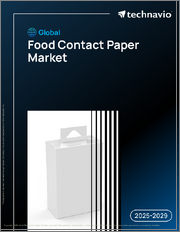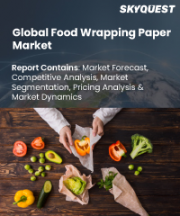
|
시장보고서
상품코드
1622526
식품 접촉지 시장 규모 : 제품별, 용도별, 지역별, 범위 및 예측Global Food Contact Papers Market Size By Product (Kraft Paper, Specialty Paper, Recycled Paper), By Application (Bakery & Confectionery, Fresh Food, Dairy Products, Fast Food, Baby Food), By Geographic Scope And Forecast |
||||||
식품 접촉지 시장 규모와 예측
식품 접촉지 시장 규모는 2023년에 752억 5,000만 달러로 평가되었고, 2024년부터 2031년까지 연평균 복합 성장률(CAGR) 4.45%로 성장하여 2031년에는 1,066억 1,000만 달러에 달할 것으로 예측되고 있습니다. 식품과 직접 접촉하도록 특별히 설계 및 제조된 재료 이 종이는 일반적으로 버진 펄프와 재생지 등 식품에 안전한 원료로 만들어져 식품에 안전한 코팅이나 치료가 실시되어 있습니다. 그리고 저장, 운송, 소비시 위생과 신선도를 유지하는 것입니다.
식품 접점은 구운 과자, 샌드위치, 패스트 푸드, 과자, 반찬, 기타 많은 요리 및 신선한 식품 포장 등 식품 산업에서 널리 사용됩니다.
또한 식품 취급에 편리하고 안전한 솔루션을 제공하고 오염으로부터 보호하며 공급망 전반에 걸쳐 품질을 보장합니다.
식품 접촉지 세계 시장 역학
식품 접촉지 시장을 형성하는 주요 시장 역학
주요 시장 성장 촉진요인
규정 준수 및 안전 기준:
식품 접촉지 시장은 포장에서 식품의 안전성과 위생을 보장하기 위한 엄격한 규제의 영향을 크게 받고 있습니다. 따라서 생산자는 혁신과 안전 기준을 준수해야하며 시장 성장의 원동력이되었습니다.
소비자의 위생 포장에 대한 의식과 수요 :
소비자의 건강, 청결 및 플라스틱 오염의 우려에 대한 인식 증가는 식품 접촉지에 대한 수요 증가를 가져왔습니다. 안전성과 지속가능성을 모두 제공하는 종이 기반 포장 솔루션에 대한 동향을 볼 수 있습니다.
혁신과 기술의 진보:
배리어 특성, 강도, 내구성을 향상시키기 위한 식품접촉재료의 생산과 치료에 있어서의 기술 개발은 식품 접촉지 시장의 주된 촉진요인입니다. 식품의 신선도를 유지하면서 유지나 물에 견디는 코팅 등 기술 혁신은 식품업계의 다양한 요건에 대응하여 시장을 전진시키고 있습니다.
환경에 대한 우려와 지속가능성에 대한 노력 :
지속가능성과 플라스틱 폐기물 감소를 요구하는 세계적인 움직임으로 종이 기반 패키징 솔루션에 대한 요구가 높아지고 있습니다. 이러한 환경 동향은 생산자와 고객에게 종이 기반 패키징을 사용하도록 촉구하여 시장을 확대하고 있습니다.
주요 과제
기술적 한계와 성능 문제:
기술 개발에도 불구하고, 식품 포장 용지는 플라스틱의 동등품과 비교하면, 배리어 특성이나 내구성에 한계가 있습니다.
대체 포장 재료와의 경쟁 :
내구성, 유연성, 비용 효율적인 플라스틱 및 바이오플라스틱과 같은 대체 포장 재료는 식품 접촉지 시장에 큰 어려움을 겪고 있습니다. 제조 방법과 함께 식품 접촉지의 성장과 수용성의 장벽이 되고 있습니다.
주요 동향 :
재활용 재료의 사용 증가:
식품 접촉지 제조에 재활용 재료를 사용하는 경향이 커지고 있습니다. 이러한 마이그레이션은 환경에 미치는 영향을 줄이고 지속 가능한 패키징 솔루션에 대한 소비자 수요에 부응하는 두 가지 목표가 동기입니다. 제조업체는 엄격한 식품 안전 규정을 충족하는 안전하고 위생적인 재생 종이 제품의 제조에 주력하고 있습니다.
장벽 기술 혁신 :
시장에서는 식품 접촉지의 기능성을 향상시키기 위한 장벽 기술이 비약적으로 진보하고 있습니다. 이러한 획기적인 진보는 내유성, 내유성, 내습성을 향상시키고 안전성과 재활용성을 유지하면서 포장 상품의 유통기한을 연장하는 친환경 코팅제 및 처리제 개발 포함됩니다.
사용자 정의 및 브랜딩 기회:
식품 콘택트 페이퍼는 브랜딩이나 개인화에 활용되는 기회가 늘고 있습니다. 종이 패키지에 고품질의 선명한 디자인을 인쇄할 수 있기 때문에 기업은 매장에서 제품을 차별화하고 브랜드 인지도를 높이고 지속가능성에 대한 노력을 고객에게 전달할 수 있으며 개인화 및 브랜드화 패키지로의 동향에 박차가 걸립니다.
목차
제1장 세계 식품 접촉지 시장의 소개
- 시장 개요
- 조사 범위
- 전제조건
제2장 주요 요약
제3장 VERIFIED MARKET RESEARCH의 조사 방법
- 데이터 마이닝
- 검증
- 1차 인터뷰
- 데이터 소스 일람
제4장 식품 접촉지 세계 시장 전망
- 개요
- 시장 역학
- 성장 촉진요인
- 억제요인
- 기회
- Porter's Five Forces 모델
- 밸류체인 분석
제5장 식품 접촉지 세계 시장 : 제품별
- 개요
- 크라프트지
- 특수지
- 재생지
- 기타 제품
제6장 식품 접촉지 세계 시장 : 용도별
- 개요
- 베이커리 및 과자류
- 신선한 식품
- 유제품
- 패스트푸드
- 베이비 푸드
- 기타
제7장 식품 접촉지 세계 시장 : 지역별
- 개요
- 북미
- 미국
- 캐나다
- 멕시코
- 유럽
- 독일
- 영국
- 프랑스
- 기타 유럽
- 아시아태평양
- 중국
- 일본
- 인도
- 기타 아시아태평양
- 세계 기타 지역
- 라틴아메리카
- 중동 및 아프리카
제8장 세계 식품 접촉지 시장 : 경쟁 구도
- 개요
- 각사 시장 랭킹
- 주요 발전 전략
제9장 기업 프로파일
- INTERNATIONAL PAPER
- WESTROCK
- DOMTAR
- SONOCO
- SEALED AIR
- MONDI
- HUHTAMAKI
- AMCOR
- BALL CORPORATION
- TETRA PAK
제10장 부록
- 관련 조사
Food Contact Papers Market Size And Forecast
Food Contact Papers Market size was valued at USD 75.25 Billion in 2023 and is projected to reach USD 106.61 Billion by 2031, growing at a CAGR of 4.45% from 2024 to 2031. Food contact papers are materials that are specifically designed and manufactured to come into direct contact with food products without transferring any dangerous compounds or modifying the taste, odor, or safety of the meal. These papers are typically created from food-safe ingredients, such as virgin pulp or recycled paper, with food-safe coatings or treatments applied. Their major function is to package, wrap, or confine food items, maintaining sanitation and freshness during storage, transportation, and consumption.
Food contact papers are widely used in the food business, including the packaging of baked products, sandwiches, fast food, confectionary, deli meats, and many other ready-to-eat or perishable food items.
Furthermore, they provide a convenient and safe solution for food handling, protecting against contamination and ensuring quality throughout the supply chain.
Global Food Contact Papers Market Dynamics
The key market dynamics that are shaping the Food Contact Papers Market include:
Key Market Drivers
Regulatory Compliance and Safety Standards:
The Food Contact Papers Market is heavily influenced by tight regulatory regulations designed to assure food safety and hygiene in packaging. Governments and regulatory agencies throughout the world are establishing stringent criteria for materials that come into contact with food, forcing producers to innovate and comply with safety standards, hence driving market growth.
Consumer Awareness and Demand for Hygienic Packaging:
Consumers' growing awareness of health, cleanliness, and the concerns of plastic contamination has resulted in rising demand for food contact papers. Consumers are looking for eco-friendly, sustainable, and safe packaging options, resulting in a trend towards paper-based packaging solutions that provide both safety and sustainability.
Innovation and Technological Advancements:
Technological developments in the production and treatment of food contact materials to improve barrier characteristics, strength, and durability are key drivers in the Food Contact Papers Market. Innovations such as coatings that withstand grease, oil, and water while retaining food freshness are moving the market forward by addressing the food industry's diversified requirements.
Environmental Concerns and Sustainability Initiatives:
The global drive for sustainability and avoiding plastic waste is resulting in a growing desire for paper-based packaging solutions. Food contact papers are recyclable and biodegradable, which aligns with environmental sustainability aims. This environmental trend is pushing producers and customers alike to use paper-based packaging, consequently expanding the market.
Key Challenges:
Technical Limitations and Performance Issues:
Despite technological developments, food contact papers continue to exhibit limited barrier characteristics and endurance when compared to plastic equivalents. Moisture and grease resistance, as well as keeping food fresh over time, constitute significant barriers to greater approval in some food packaging applications.
Competition from Alternative Packaging Materials:
Alternative packaging materials, such as plastics and bioplastics, which offer improved durability, flexibility, and cost-effectiveness, pose a significant challenge to the Food Contact Papers Market. Innovations in these competing materials, together with long-standing consumer habits and manufacturing methods, pose a barrier for the growth and acceptability of food contact papers.
Key Trends:
Increased Use of Recycled Materials:
There is an increasing trend of using recycled materials in the creation of food contact papers. This transition is motivated by two goals: decreasing environmental impact and addressing consumer demand for sustainable packaging solutions. Manufacturers are concentrating on creating safe and sanitary recycled paper products that meet demanding food safety regulations.
Innovations in Barrier Technologies:
The market is witnessing tremendous advances in barrier technologies to improve the functionality of food contact paper. These breakthroughs include the creation of environmentally friendly coatings and treatments that improve grease, oil, and moisture resistance, prolonging the shelf life of packaged goods while maintaining safety and recyclability.
Customization and Branding Opportunities:
Food contact papers are increasingly being utilized for branding and personalization. The ability to print high-quality, bright designs on paper packaging enables businesses to differentiate their products on store shelves, increase brand awareness, and communicate sustainability efforts to customers, fueling the trend towards personalized and branded packaging.
What's inside a VMR industry report?
Our reports include actionable data and forward-looking analysis that help you craft pitches, create business plans, build presentations and write proposals.
Global Food Contact Papers Market Regional Analysis
Here is a more detailed regional analysis of the Food Contact Papers Market:
Asia Pacific:
According to VMR Analyst, Asia Pacific is estimated to dominate the Food Contact Papers Market during the forecast period. Asia Pacific's dominance in the Food Contact Papers Market is fueled by the region's rapid economic growth and urbanization. As economies grow, disposable income and living standards rise, leading to increased consumption of packaged foods and, as a result, a greater demand for food contact papers.
The region has a thriving food and beverage industry, fueled by its big population and growing middle class. This expansion is a major driver for the Food Contact Papers Market, as there is an ongoing need for clean and sanitary packaging materials to suit the growing demand for packaged foods, snacks, and fast food.
Furthermore, there is a growing awareness regarding sustainability along with the presence of stringent regulatory reforms enable in the expansion of Food Contact Papers Market. Governments and customers alike are exhibiting a preference for eco-friendly and sustainable packaging options, which is encouraging the use of food contact papers over plastic. This is backed up by efforts and laws aimed at decreasing plastic waste and encouraging the use of renewable resources.
North America:
North America's Food Contact Papers Market is heavily driven by the region's strict regulatory regulations for food safety and packaging materials. Agencies such as the United States Food and Drug Administration (FDA) and Health Canada set tight criteria to assure the safety of food contact materials, boosting demand for high-quality, compliant paper packaging.
Consumer demand in North America for sustainable and eco-friendly packaging solutions is increasing, driven by rising environmental awareness and concerns about plastic pollution. Consumers are actively searching out products with recyclable, biodegradable, or compostable packaging, increasing in demand for food contact papers as a greener alternative to plastic packaging.
Furthermore, the fast-paced lifestyle in North America has resulted in a surge in the quick service restaurant (QSR) business and meal delivery services. This trend has increased demand for disposable, sanitary, and convenient packaging solutions, making food contact papers more popular for wrapping, serving, and delivering a wide range of foods.
Europe:
Europe is a leader in enforcing rigorous environmental legislation and policies aimed at reducing plastic consumption and increasing packaging sustainability. The European Union's regulations on single-use plastics and circular economy efforts significantly promote the use of recyclable and renewable materials, increasing demand for food contact sheets as an environmentally friendly alternative to plastic packaging.
The region's high emphasis on quality and safety standards for food packaging, combined with the cultural significance of food, supports the expansion of the Food Contact Papers Market. This is bolstered by the development of quick-service restaurants and the growing popularity of food delivery services, which increases the demand for hygienic, disposable, and ecological packaging solutions.
Furthermore, Europe's emphasis on packaging research and development drives continual innovation in food contact papers, including breakthroughs in barrier technologies and the development of compostable and biodegradable papers. These technical improvements enhance the functionality, safety, and environmental impact of food contact materials, making them more desirable to consumers and businesses alike.
Global Food Contact Papers Market: Segmentation Analysis
The Global Food Contact Papers Market is segmented on the basis of Product, Application, And Geography.
Food Contact Papers Market, By Product
- Kraft Paper
- Specialty Paper
- Recycled Paper
- Other Products
Based on Product, The market is segmented into Kraft Paper, Specialty Paper, Recycled Paper, and Other Products. Kraft paper segment is estimated to dominate the Food Contact Papers Market. Kraft paper is well-known for its strength, durability, and resistance to tearing and puncturing, making it an excellent choice for maintaining the integrity and preservation of food items throughout storage and transportation. Furthermore, kraft paper is often created from natural, renewable fibers, which aligns with the rising consumer desire for sustainable and environmentally friendly packaging options. Its adaptability allows for a variety of treatments and coatings to improve its barrier qualities, ensuring that it passes high food safety standards.
Food Contact Papers Market, By Application
- Bakery & Confectionery
- Fresh Food
- Dairy Products
- Fast Food
- Baby Food
- Others
Based on Application, The market is segmented into Bakery & Confectionery, Fresh Food, Dairy Products, Fast Food, and Others. The bakery & confectionery application segment is estimated to exhibit the highest growth in the forecast period in the Food Contact Papers Market due to its essential role in packaging and preserving a wide range of baked goods and sweet delights. This market includes a wide variety of products, such as bread, pastries, cakes, chocolates, candies, and snacks, all of which require dependable and food-safe packaging solutions to guarantee freshness and quality. Food contact papers thrive in this sector because they provide a sanitary barrier between the food and external contaminants while also being easy to handle and serve. Their adaptability allows for a variety of packaging options, including bags, wraps, trays, and boxes, meeting the unique packaging requirements of bakery and confectionery items.
Key Players
- The "Global Food Contact Papers Market" study report will provide valuable insight with an emphasis on the global market. The major players in the market are
- International Paper, WestRock, Domtar, Sonoco, Sealed Air, Mondi, Huhtamaki, Amcor, Ball Corporation, Tetra Pak, Stora Enso, Nippon Paper Industries, Oji Group, WEYERHAEUSER, UPM-Kymmene, MeadWestVaco, Packaging Corporation of America, Cascades, Intertape Polymer Group, and Berry Global Group.
Our market analysis also entails a section solely dedicated to such major players wherein our analysts provide an insight into the financial statements of all the major players, along with product benchmarking and SWOT analysis. The competitive landscape section also includes key development strategies, market share, and market ranking analysis of the above-mentioned players globally.
- Food Contact Papers Market Recent Developments
- In January 2024, International Paper announced intentions to invest $47 Million to expand its food service packaging business in DeRidder, Louisiana. The expansion will assist fulfil the growing demand for sustainable food packaging solutions.
- In January 2024, WestRock introduced their new line of 'EcoWrap' food wrap, which is manufactured from 100% recycled paper and is suitable for both residential and commercial use. The manufacturer claims the product is completely recyclable and performs similarly to regular plastic wrap.
- In January 2024, Domtar announced a collaboration with Bio-Based Industries to create and commercialize novel biodegradable food packaging solutions derived from renewable resources. This collaboration intends to meet the growing customer demand for sustainable packaging choices.
- In December 2023, Amcor announced a $6.8 Billion deal to acquire Bemis Company, a prominent maker of flexible packaging solutions. This acquisition is expected to boost Amcor's position in the food packaging industry.
TABLE OF CONTENTS
1 INTRODUCTION OF GLOBAL FOOD CONTACT PAPERS MARKET
- 1.1 OVERVIEW OF THE MARKET
- 1.2 SCOPE OF REPORT
- 1.3 ASSUMPTIONS
2 EXECUTIVE SUMMARY
3 RESEARCH METHODOLOGY OF VERIFIED MARKET RESEARCH
- 3.1 DATA MINING
- 3.2 VALIDATION
- 3.3 PRIMARY INTERVIEWS
- 3.4 LIST OF DATA SOURCES
4 GLOBAL FOOD CONTACT PAPERS MARKEOUTLOOK
- 4.1 OVERVIEW
- 4.2 MARKET DYNAMICS
- 4.2.1 DRIVERS
- 4.2.2 RESTRAINTS
- 4.2.3 OPPORTUNITIES
- 4.3 PORTERS FIVE FORCE MODEL
- 4.4 VALUE CHAIN ANALYSIS
5 GLOBAL FOOD CONTACT PAPERS MARKET, BY PRODUCT
- 5.1 OVERVIEW
- 5.2 KRAFT PAPER
- 5.3 SPECIALTY PAPER
- 5.4 RECYCLED PAPER
- 5.5 OTHER PRODUCTS
6 GLOBAL FOOD CONTACT PAPERS MARKE, BY APPLICATION
- 6.1 OVERVIEW
- 6.2 BAKERY & CONFECTIONERY
- 6.3 FRESH FOOD
- 6.4 DAIRY PRODUCTS
- 6.5 FAST FOOD
- 6.6 BABY FOOD
- 6.7 OTHERS
7 GLOBAL FOOD CONTACT PAPERS MARKE, BY GEOGRAPHY
- 7.1 OVERVIEW
- 7.2 NORTH AMERICA
- 7.2.1 U.S.
- 7.2.2 CANADA
- 7.2.3 MEXICO
- 7.3 EUROPE
- 7.3.1 GERMANY
- 7.3.2 U.K.
- 7.3.3 FRANCE
- 7.3.4 REST OF EUROPE
- 7.4 ASIA PACIFIC
- 7.4.1 CHINA
- 7.4.2 JAPAN
- 7.4.3 INDIA
- 7.4.4 REST OF ASIA PACIFIC
- 7.5 REST OF THE WORLD
- 7.5.1 LATIN AMERICA
- 7.5.2 MIDDLE EAST AND AFRICA
8 GLOBAL FOOD CONTACT PAPERS MARKECOMPETITIVE LANDSCAPE
- 8.1 OVERVIEW
- 8.2 COMPANY MARKET RANKING
- 8.3 KEY DEVELOPMENT STRATEGIES
9 COMPANY PROFILES
- 9.1 INTERNATIONAL PAPER
- 9.1.1 OVERVIEW
- 9.1.2 FINANCIAL PERFORMANCE
- 9.1.3 PRODUCT OUTLOOK
- 9.1.4 KEY DEVELOPMENTS
- 9.2 WESTROCK
- 9.2.1 OVERVIEW
- 9.2.2 FINANCIAL PERFORMANCE
- 9.2.3 PRODUCT OUTLOOK
- 9.2.4 KEY DEVELOPMENTS
- 9.3 DOMTAR
- 9.3.1 OVERVIEW
- 9.3.2 FINANCIAL PERFORMANCE
- 9.3.3 PRODUCT OUTLOOK
- 9.3.4 KEY DEVELOPMENTS
- 9.4 SONOCO
- 9.4.1 OVERVIEW
- 9.4.2 FINANCIAL PERFORMANCE
- 9.4.3 PRODUCT OUTLOOK
- 9.4.4 KEY DEVELOPMENTS
- 9.5 SEALED AIR
- 9.5.1 OVERVIEW
- 9.5.2 FINANCIAL PERFORMANCE
- 9.5.3 PRODUCT OUTLOOK
- 9.5.4 KEY DEVELOPMENTS
- 9.6 MONDI
- 9.6.1 OVERVIEW
- 9.6.2 FINANCIAL PERFORMANCE
- 9.6.3 PRODUCT OUTLOOK
- 9.6.4 KEY DEVELOPMENT
- 9.7 HUHTAMAKI
- 9.7.1 OVERVIEW
- 9.7.2 FINANCIAL PERFORMANCE
- 9.7.3 PRODUCT OUTLOOK
- 9.7.4 KEY DEVELOPMENTS
- 9.8 AMCOR
- 9.8.1 OVERVIEW
- 9.8.2 FINANCIAL PERFORMANCE
- 9.8.3 PRODUCT OUTLOOK
- 9.8.4 KEY DEVELOPMENTS
- 9.9 BALL CORPORATION
- 9.9.1 OVERVIEW
- 9.9.2 FINANCIAL PERFORMANCE
- 9.9.3 PRODUCT OUTLOOK
- 9.9.4 KEY DEVELOPMENTS
- 9.10 TETRA PAK
- 9.10.1 OVERVIEW
- 9.10.2 FINANCIAL PERFORMANCE
- 9.10.3 PRODUCT OUTLOOK
- 9.10.4 KEY DEVELOPMENTS
10 APPENDIX
- 10.1.1 RELATED RESEARCH



















